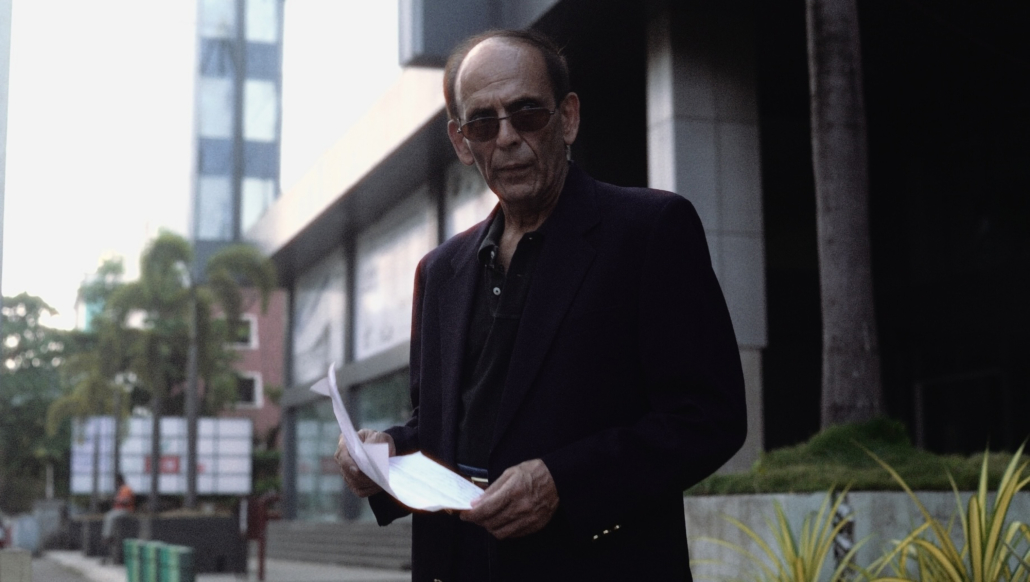In Kabir Mehta’s “Night Out With Ronnie,” an ex-elite playboy holds up his faded past in persistent remembrance. Reflecting Mehta’s affinity for cracking open the artifice of filmmaking, the short examines the chasm between perception and naked truth. Once again, we encounter a single, predominating character, and the film unravels as a series of problematizing our gaze. Cinema is as much about the lives it inhabits as it is about the clash between our inferences, assumptions, and unguarded truth, the space of new meaning it unlocks.
Mehta met Ronnie at the gym and fell instantly captive to his dazzling stories. When the film opens, the 70-year-old man boasts about his abs. Ronnie puts on the act of a man with posh pursuits. He talks about the three decades he spent in England, playing polo in Argentina. He claims that once, he nearly married a princess in Pakistan. Neither does he feel connected to his Indian identity.
Mehta confesses not buying into Ronnie’s many tales, his ‘grand performance’. He takes it all with a pinch of salt, a fair deal of amusement. But his curiosity about Ronnie doesn’t dim. The latter, too, exerts a hold. His lifestyle contradicts the swagger he wields. Soon, this showboating is unmasked as a sort of rusted armour. All that he talks of is told as if his globe-trotting life of high revelry hasn’t ended. Intrigued by Ronnie’s pose, Mehta can’t resist filming him.
In Mehta’s film, Ronnie spots a chance to resurrect his fortune and turn his life around. His desperation—wretched submission to be up for anything that can promise revival—embodies the ultimate loneliness. Mehta wryly remarks that Ronnie hasn’t a clue about the kind of films he makes. If he did, he wouldn’t have agreed. He wants to be a movie star. So, he’s just clutching at straws.
Eventually, the more sobering underside to Ronnie’s life surfaces. Abandoned, cast off by his own family, his colourful, fanciful anecdotes are the social life, the glitter he yearns for. A residue of a snazzier past dipped in aristocratic privilege, he’s trapped in its memories instead of acknowledging the present.

What does the front we put on say about us? Mehta pulls through the veil between hiding and projection, a buried self and spectacular display. Ronnie drives an old car. A cross between documentary and fiction, “Night Out With Ronnie” is haunted by delusions and wrangling hopes of those latching onto imaginary tethers. There are insecurities, anguish, a thick shell of regrets and mistakes, and Ronnie is subsumed in them. He lives off a stubborn belief in a now-mythic lifestyle, convinced it can shelter him from the past’s unflattering glare. Ronnie wants to seduce everyone with his cosmopolitan sparkle and charisma.
With insouciance and irreverence, Mehta situates a fluid form, one using the prism of self-reflexivity as dredging up the unsaid. He looks through the varied nodal points at which life and cinema meet. This collision may be designed, but its shifting agreement undercuts layers of presentation. The director is thrilled when he finds a hook for the film. Through a mutual friend, Mehta discovers more about Ronnie than the latter intends. His access to Ronnie’s life and secrets gradually deepens the intimacy and clears the deliberate smokescreen.
“Night Out With Ronnie” pushes a constant, lively, evolving filmmaker-subject relationship as the axis. Neither are we severed from the mechanics of this representation. We also watch how Mehta puts the film together. He places Ronnie and himself as active co-participants. Ronnie asks Mehta how he can fit a life within a short film, especially one as extravagantly dynamic as his. The film switches between the orchestrated and the verité. It gets hard to tell where one ends and the other begins.
“Night Out With Ronnie” moves from the flashy to places that are sore, intensely despairing. Mehta isn’t one who just lets his subject be. Rather, he engages and provokes him, scanning the repressed. Steadily, the film grows overcast with something more sombre. Mehta’s aesthetic slant also shifts. The early gauze of Ronnie’s bright assertiveness wears off. His fragility becomes sharper, as does the weight of his lapses. The degree to which he can go in search of tenderness is immeasurably moving.
From the uneasy, nonetheless revealing tangle between unobtrusive immersion and designed intervention, Mehta mines a dramatic pull of aching introspection. The climactic encounter between Mehta and Ronnie, awash in fresh knowledge, lends “Night Out With Ronnie” a teasing edge. Wistful but also cheeky, it’s a perfect encapsulation of Mehta’s distinct voice.




![Let It Snow [2019] Netflix Review: This Holiday themed film can trigger the Christmassy feeling](https://79468c92.delivery.rocketcdn.me/wp-content/uploads/2019/11/let-it-snow-movie-review-2019-768x320.jpg)


![Saudade [2012] Review – Visual Symphony of Static and Dynamic](https://79468c92.delivery.rocketcdn.me/wp-content/uploads/2020/03/Saudade-2012-768x560.jpg)
![I Trapped the Devil [2019] Review: An unengaging genre film serving as an allegory for alienation](https://79468c92.delivery.rocketcdn.me/wp-content/uploads/2019/04/I-trapped-The-Devil_HOF-768x324.jpg)